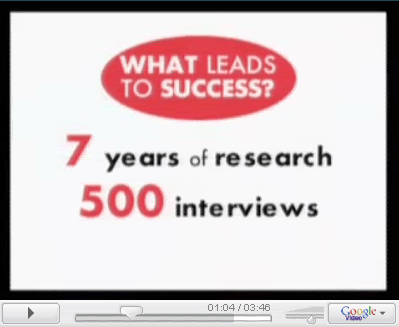I was having lunch with a couple of business associates and I couldn't help overhearing the conversation taking place at the next table.
A quiet older couple were politely discussing how tough the man's steak was. She said, "Tell them, send it back" and he said, "No, no, it's OK." She insisted and he refused. He didn't
want to eat it and he didn't send it back. He paid the bill and left a tip. I could hear him say, "It wasn't the waiters fault" as they left the restaurant.
They were nice customers, weren't they? Polite, courteous, respectful. Let me tell you what else they were. They were customers who will never return.
Get your customers to complain.
It's not a lot of fun listening to a disgruntled customer, but finding and listening to them, may just be one of the most profitable things you can do.
Why would you want them to complain?
According to Dr. Ivan Misner, a leading authority on "word of mouth" marketing there are 4 reasons.
1. You can't fix a problem you don't know about.
2. If you have a problem, you're probably not alone. It may be the process or system itself.
3. They most likely won't come back.
4. They will tell others about their bad experience.
I'll add 3 more
5. If it happens often enough, and you don't know anything about it, your business begins to slow down and you may begin to blame the market, or your manager, or the company, or worse yet, you may think something like "I have all the crappy customers."
6. You may not see the person complaining as an opportunity. A Golden Opportunity. It's what you do when things go wrong that tell the customers what you're all about. A defining moment to say the least.
7. Your business may begin to fall off a bit, so you decide to spend some expensive advertising dollars to pick it up. This is the most common and deadly mistake.
You know how the song goes. "Looking for love in all the wrong places."
You get the point!
Nice customers quietly go away, they don't make a scene, they don't write letters to complain, they don't fill out survey forms, they don't have a union, and they don't meet.
This is what they do.
A SINGLE DISSATISFIED CUSTOMER TELLS ON AVERAGE 12 OTHER PEOPLE, AND ONE IN FIVE TELLS 20 OTHERS.
Good customers take the risk and tell you when something is wrong.
This is so important to understand and respect.
So now what do you do?
Play a simple game with all your customers. The game is called:
TGW,Things Gone Wrong. Find the disgruntled customer.
It's fast, it's inexpensive, it's in real time, it WOW's your customers!
Call your customers DURING your business transaction and ask questions like this:
"How do you feel you've been treated so far?"
"How do you feel your been treated by our staff?"
"I just called to see how you were doing. Is everything OK?"
Call your customers AFTER your business transaction and ask questions like this:
"Thanks for using my services. I really appreciate your business. I was wondering if I could ask you a few questions that would help me to improve my service. From your perspective what could you see that we could do better to improve our service for our future customers?"
"Thanks for your business and congratulations on your new home.
I understand you moved in over the weekend and I just wanted to make sure that everything was OK? Was it as you expected?"
"Was there anything about the experience that makes you want to tell friends, family or co-workers about us? If you are reluctant to refer anyone to us, please tell me why so that I can address what went wrong. I may not be able to undo what happened to you but I can make sure it doesn't happen to someone else."
It's that simple. We are human and things do go wrong.
The single quickest way for an organization or an individual to improve their service reputation it to play TGW. Be proactive!
Letters and surveys tell people you care, calling shows them!
As Yogi Berra said, "If nobody wants to come back to the ballpark, nobody is going to stop them."
You can tell customers all day long that you're professional, attentive, reliable, caring, empathic, kind, customer focused or you can show them in deed.
People tend to believe what they see for themselves.
Remember:
It is what you do to manage their perception of you. We live in our customer's reality. People refer others because of how they feel they were treated and the likelihood that their referrals will be treated the same way.
Thanks for spending 3 minutes with me...
The best is yet to be...
On Your Team
Jeffrey Stanton
Your Trusted Advisor For Life
347-466-3047
One of the fastest ways to build a successful referral based business is by training. Now, with me, I like to invest significant time immersing myself in training, while some people prefer to take it in bite-size chunks. Whatever your preference is, now is the best time to contact me.
If you have found this tip useful, please share it with any friends, family, colleagues and associates who you think will be interested. Feel free to print it (with credit and subscription information) and continue to enjoy the tips. I am always grateful for any comments, criticisms or other feedback that you may have. Please send them to feedback@jeffreysjournal.com


































No comments:
Post a Comment